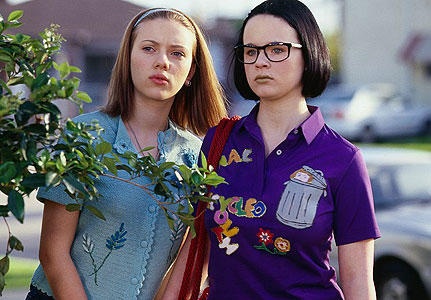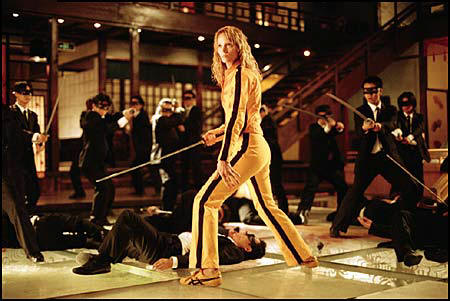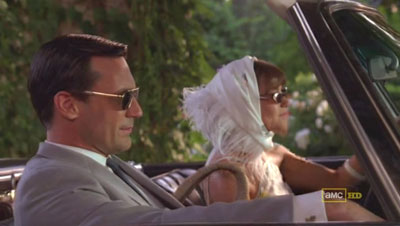It’s been a pretty wild ten years, I already discussed some of the larger trends in cinema, but now it’s time to discuss the ten best films of the decade. Yes, there’s still a few more key films to see, but I’m going to go ahead and put the list out now. Read on to find out the best on 00s cinema.
10. Ghost World - This film is the best kind of cross media adaptation. Most movies fail for not getting enough of the book, others, like the recent Watchmen film, failed for bringing nothing new to the table. Ghost World doesn’t try to replace the great comic book on which it’s based, it chooses instead to further flesh out the universe of the comic, and in the process functions perfectly as both a standalone film and as in tandem with the book.
And the film itself is one of the most probing explorations of the way that people in our irony driven culture struggle to express themselves and find meaning in a world where any sincere expression of feeling is considered uncool. Thora Birch seems to have vanished from films, but she was brilliant here, showing us the divide between Edith’s cold, cynical exterior and the lively, emotional person underneath. It’s one of the best depictions of the teenage experience in film, and even as loser heroes and a disdain for the mainstream became commonplace as the decade went on, few films managed to bring the insight and emotion this one did.

9. Waking Life - I’ve been happy to see this film pop up on a few other best of the decade lists, since I sensed a kind of backlash against it in recent years. I love it as a dreamlike meditation on a wide variety of interesting concepts and philosophical issues. I love works that force you think about the way you view the world, and give you new ideas and concepts to ponder. I first saw this movie shortly after reading The Invisibles for the first time, and it was a great followup, bringing me more philosophy and ideas to ponder.
And, despite its non-narrative nature, there is an interesting build and emotional engagement in the film. When Wiley floats away at the end of the film, there’s a sense of transcendence, of surrendering to the dream that may be our entire reality. All this is even without commenting on the film’s strikingly varied visual approach. As one of the speakers says, the most transcendent experience is discussion between two people, to share a part of ourselves with others, and become something more.

8. Donnie Darko - Another film that’s gone through a wave of critical praise and cultural backlash, I watched the film again a few months ago, and while it was clumsier in some ways than I remembered, with a lot of awkward dialogue and some odd plotting choices, it’s still a phenomenal work, an exquisite fusion of the Tibetan book of the dead with a twisted John Hughes universe. It’s a film that elevates the everyday into a transcendent struggle and features a myriad of visual elements that have already become iconic.
On top of the endlessly debatable philosophical elements, the film has a great soundtrack, including fantastic moments set to The Church’s “Under the Milky Way,” and Joy Division’s “Love Will Tear Us Apart.” Kelly hasn’t quite fulfilled the promise of this film, but as it is, it’s one of the strongest debut features of all time.

7. Inglorious Basterds - I haven’t loved a movie the way I loved Inglorious Basterds in a long time. The film snuck up one, I love Tarantino’s previous work, but weak Cannes buzz and a premise that didn’t thrill me meant I went in with mixed expectations. But, I left with total love for the film. Tarantino’s rambling, episodic narrative style has never been used to better effect, with each chapter building on the next, and altering tones and subject matter while maintaining an intense mastery of suspense.
It’s the final chapter where the film ascends to the level of the sublime, drawing together the film’s many disparate threads into a perfectly staged action climax. The high point for me, and one of the most haunting and beautiful images in cinema was Shoshanna’s post mortem message to the Germans who killed her and her family. The cinema screen igniting as she laughs is an image loaded with endless metaphors, but most importantly is pure emotion in the moment. People talk about the 90s as the decade of Tarantino, but for me, his 00s output is vastly superior.

6. The New World - Terence Malick was hailed as a master after only two films, and it’s amazing that in his twenty year absence from filmmaking, very few people even attempted to make the kind of dreamlike, beautiful films that he specializes in. And, with The New World, he made his masterpiece, an articulate distillation of the themes that consumed his previous films. First off, The New World is as beautiful as any film you’ll see. The way the sun cuts through trees, or reflects off water is astonishing, he manages to so thoroughly immerse you in the edenic world of pre-colonization America that when we finally get to the British civilization at the end of the film, it feels like an utterly alien culture.
But, it’s not just the visuals yet. The romance between John Smith and Pocohontas becomes an allegory for the European romance with the idea of America itself, and in the passage of men like Smith from the world, we see the way that America changed from a blank slate world that could be anything, to an extension of the European society that Smith fled. Smith is someone who crosses between worlds, and through his eyes, we become part of a society that seems initially alien, but is quickly welcoming and beguiling. Colin Farrell is fantastic in the film, but the real star is Q’Orianka Kilcher, who gives one of the decade’s best performances and embodies the spirit of the world Malick created. This film is practically a religious experience, a communion with a world far removed from our own, a dream that echoes down across time and calls us back to an eden long gone.

5. Before Sunset - The second Linklater film on the list has the most of the strengths I discussed earlier with Waking Life, the interesting philosophical concepts and fascinating discussion, but it adds an intense emotional element to the proceedings, so that you’re fully engaged on both an intellectual and emotional level. Sequels have such a bad track record, and particularly with a film as time capsule perfect as Before Sunrise, it seems like there’d be nowhere to go but down. But, in exploring the impact of Jesse and Celine’s meeting in a very real way, the film itself functions as almost a meta comment on our fear that the sequel will ruin what came before. They want to preserve that moment in amber, and let it stand as was, even as they’re drawn back together again. And, so are we, and thankfully, the film eclipses even its stellar predecessor with its probing examination of the way that a great experience has become a haunting emblem of what could be for these characters.
For a film that’s literally just two people talking, it’s extremely intense, winding its way from surface pleasantries and general discussion of themes and issues to an intense examination of what their relationship could be and whether it’s worth the risk for them to try to be together. And, the film’s final moments are a perfect ambiguous coda for these characters, at least until a few more years pass and we hopefully check in with them again.

4. 2046 - Another sequel to an arty film about a man haunted by a brief, but potent love 2046 takes a less direct approach than Before Sunset, but is similarly powerful in its examination of the ghosts that haunt us all. Most people are hailing In the Mood for Love as Wong Kar-Wai’s best film of the decade, and I love that movie too, but for me, In the Mood for Love misses out on a lot of the things that make WKW’s movies so great. It’s much more controlled and unified than his work typically is, a far cry from 2046’s jumbled chronology and mix of allegorical future segments with its period setting.
The whole film is gorgeous, but the future segments in particular are just unbelievable. Faye Wong walking through the train her shoes lighting up as she goes is one of my favorite images from the decade in film. Ultimately, the film is a perfect distillation of WKW’s aesthetic, drawing in elements from all his previous films. It’s such a perfect summation of his talent, he had basically no choice but to do something different after, this is his greatest hits tour, and it’s one of his most enduring and brilliant films.

3. Irreversible - There are some films that are talked about more as endurance tests than as enjoyable experiences, and films like Requiem for a Dream or Fat Girl pushed the boundaries of what an audience can tolerate. But, even those films can’t match the reputation of Irreversible, a film infamous for its ten minute real time rape scene and gruesome fire extinguisher assault. And yes, those are brutal sequences, but just focusing on those scenes ignores the film’s greatest strengths.
Those scenes are brutal on a spectacle level, but they become even more heartbreaking, and powerful, after you see the relationship that Alex and Marcus shared before her assault. Thanks to the backwards narrative structure we watch them going through their daily lives, oblivious to the terrible events awaiting them. Every choice they make puts them closer to the spiral that will destroy their lives, and as you watch, you can’t help but ask what if just one thing had changed. I don’t think that Noe is interested in punishing the audience, so much as upending our typical approach to a revenge movie. Seen in chronological order, the film would be a nihilistic, but emotionally satisfying film. But, seeing it in reverse makes clear how hollow revenge is. Marcus and Pierre’s quest for revenge dooms them and does nothing to heal Alex.
But, in the final moments of the film, you also get some of the most tender and emotionally authentic moments between a couple in any film. Real life couple Vincent Cassel and Monica Bellucci are fearless throughout and make the film so much more with their performances.
And, I also have to comment on the technical virtuosity of the film. The one take sequences are like nothing ever seen in cinema to date, with virtually every shot in the film featuring some kind of impossible camera move that enhances your experience of the narrative. Noe pushes boundaries, but primarily with the goal of making you feel the story, not just watch it He immerses you in character subjectivity so strongly that it makes people uncomfortable, but it’s also what makes the film a masterpiece.

2. Mulholland Dr. - As I discussed with Wong Kar-Wai and 2046, Mulholland Dr. functions as a career summation for everything Lynch has done to date, incorporating the 50s style and naïve heroines of the Blue Velvet era and blending it with the experiments in narrative subjectivity from Lost Highway to create a perfect Lynch greatest hits film. That’s not to say that it’s redundant though, it’s a refined version of what he’s done before, and comes across as his most well realized film to date.
The ingenious narrative structure has been widely dissected, but it’s notable that even as he plunges through layers of subjective reality, he keeps a coherent emotional throughline so that you can have no idea what happened, but you can understand exactly how it felt. The rambling narrative structure allows for some great vignettes along the way, and the post box sequence manages to cohere them all into a really satisfying single narrative. I love analyzing the film, but ultimately what I love most is Lynch at his best, crafting classic scenes like Betty’s audition or Club Silencio, the scene of the decade. INLAND EMPIRE is brilliant in its own way, but if Lynch never made another film after Mulholland Dr. this would be a perfect coda for his career.

1. Kill Bill Vol. 1 - All this talk of narrative structures and themes is great, but ultimately what we go to the movies for is the experience of singular moments, and no movie was more of a rush or featured as many perfect cinematic moments as Kill Bill Vol. 1. Yes, it’s not as ‘substantial’ as Tarantino’s other films, but it’s such an amazing in the moment experience that you don’t care about substance, you care about the perfect song choices for every scene, or the astonishing action sequences that are so much more satisfying than the typical bunch of cartoon characters fighting sequences we saw in many of this decade’s films.
Kill Bill for me hits that same place that Star Wars does, it’s mythic and archetypal, and a distillation of everyting that you want from a genre film. Most kung-fu movies disappoint you, they’re better in idea than conception. Kill Bill is the greatest kung-fu movie you can imagine and more, mashing up elements of countless other films into a thrilling new whole. I’ve seen the film seven or eight times at this point, and it’s still thrilling every time, best of the decade material for sure.
























